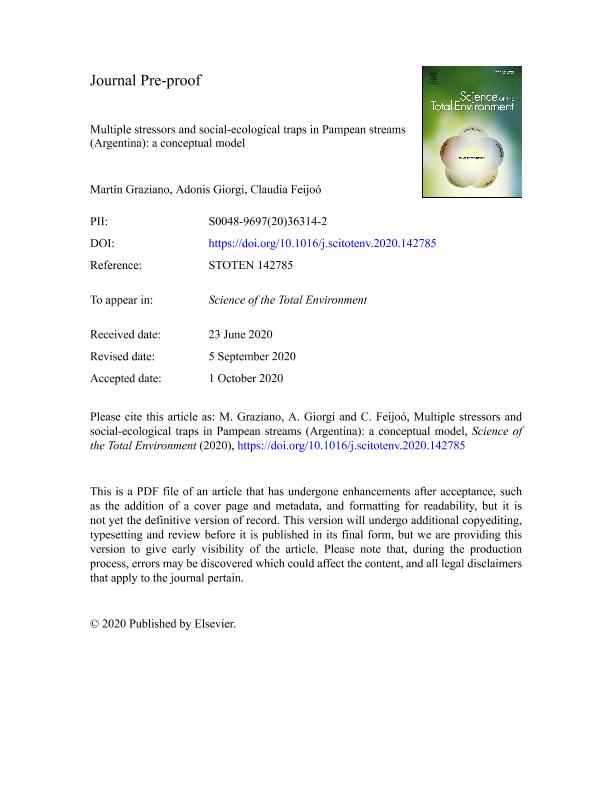Mostrar el registro sencillo del ítem
dc.contributor.author
Graziano, Martín

dc.contributor.author
Giorgi, Adonis David Nazareno

dc.contributor.author
Feijoó, Claudia Silvina

dc.date.available
2022-07-19T13:41:10Z
dc.date.issued
2020-10
dc.identifier.citation
Graziano, Martín; Giorgi, Adonis David Nazareno; Feijoó, Claudia Silvina; Multiple stressors and social-ecological traps in Pampean streams (Argentina): A conceptual model; Elsevier; Science of the Total Environment; 765; 142785; 10-2020; 1-47
dc.identifier.issn
0048-9697
dc.identifier.uri
http://hdl.handle.net/11336/162494
dc.description.abstract
Fluvial systems are particularly sensitive to changes in the terrestrial ecosystems where they are embedded, receiving simultaneously the impact of multiple stressors. The design of adequate management policies requires analyzing fluvial systems as social-ecological systems, because the decoupling of natural and social systems can lead to a severe mismatch between maintaining ecological integrity and the pursuit of human well-being. Pampean streams are especially prone to the impact of human activities because they are located in a region that provides almost half of the agricultural production of Argentina and concentrates 66% of the whole population of the country. In the present work, we conceived a general social-ecological framework that links the occurrence of multiple stressors and their impacts on ecosystem services, with changes in environmental perception of streams, which in turn feedback over institutional actions at the watershed's governance. We identified four current key drivers of the dynamics in Pampean streams: a dominant agro-industrial model for the region, a command-and-control governance regime mainly based on an engineering hydraulic perspective, the real estate market speculation of surrounding lands, and the persistence of structural poverty in urban areas. The resulting dynamics resembles the occurrence of different kinds of social-ecological traps, i.e., a highly stable but undesirable state of the system that is difficult to escape. Based on this analysis, we provide a leverage point perspective to avoid this trap. Together, this approach could be applied to other fluvial systems of the world to link the ecological and social domains to multiple stressors analysis, and to improve institutional fit for the sustainability of fluvial social-ecological systems.
dc.format
application/pdf
dc.language.iso
eng
dc.publisher
Elsevier
dc.rights
info:eu-repo/semantics/openAccess
dc.rights.uri
https://creativecommons.org/licenses/by-nc-sa/2.5/ar/
dc.subject
SOCIAL-ECOLOGICAL SYSTEMS
dc.subject
WATER GOVERNANCE
dc.subject
PAMPEAN LOWLAND STREAMS
dc.subject
ENVIRONMENTAL PERCEPTION
dc.subject
ECOSYSTEM SERVICES
dc.subject
LEVERAGE POINTS
dc.subject.classification
Ciencias Medioambientales

dc.subject.classification
Geografía Económica y Social

dc.subject.classification
CIENCIAS SOCIALES

dc.subject.classification
Ecología

dc.subject.classification
Ciencias Biológicas

dc.subject.classification
CIENCIAS NATURALES Y EXACTAS

dc.subject.classification
Biología Marina, Limnología

dc.subject.classification
Ciencias Biológicas

dc.subject.classification
CIENCIAS NATURALES Y EXACTAS

dc.title
Multiple stressors and social-ecological traps in Pampean streams (Argentina): A conceptual model
dc.type
info:eu-repo/semantics/article
dc.type
info:ar-repo/semantics/artículo
dc.type
info:eu-repo/semantics/publishedVersion
dc.date.updated
2021-09-07T18:25:54Z
dc.journal.volume
765
dc.journal.number
142785
dc.journal.pagination
1-47
dc.journal.pais
Países Bajos

dc.description.fil
Fil: Graziano, Martín. Consejo Nacional de Investigaciones Científicas y Técnicas. Oficina de Coordinación Administrativa Ciudad Universitaria. Instituto de Ecología, Genética y Evolución de Buenos Aires. Universidad de Buenos Aires. Facultad de Ciencias Exactas y Naturales. Instituto de Ecología, Genética y Evolución de Buenos Aires; Argentina
dc.description.fil
Fil: Giorgi, Adonis David Nazareno. Universidad Nacional de Luján. Instituto de Ecología y Desarrollo Sustentable. Consejo Nacional de Investigaciones Científicas y Técnicas. Oficina de Coordinación Administrativa Parque Centenario. Instituto de Ecología y Desarrollo Sustentable; Argentina
dc.description.fil
Fil: Feijoó, Claudia Silvina. Universidad Nacional de Luján. Instituto de Ecología y Desarrollo Sustentable. Consejo Nacional de Investigaciones Científicas y Técnicas. Oficina de Coordinación Administrativa Parque Centenario. Instituto de Ecología y Desarrollo Sustentable; Argentina
dc.journal.title
Science of the Total Environment

dc.relation.alternativeid
info:eu-repo/semantics/altIdentifier/url/https://linkinghub.elsevier.com/retrieve/pii/S0048969720363142
dc.relation.alternativeid
info:eu-repo/semantics/altIdentifier/doi/http://dx.doi.org/10.1016/j.scitotenv.2020.142785
Archivos asociados
